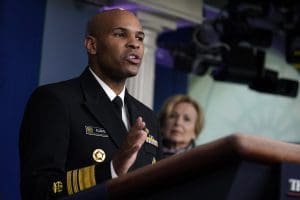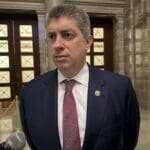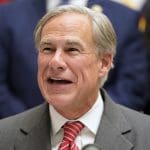Surgeon general: 'These guidelines are a national stay-at-home order'
Jerome Adams refused to call on governors who have not issued stay-at-home orders thus far, however.

Surgeon General Jerome Adams on Wednesday said Americans should consider the Trump administration’s social distancing guidelines “a national stay-at-home order.”
Adams made the remarks during an interview on NBC’s “Today” show after being asked about Florida Gov. Ron DeSantis’ refusal to issue a stay-at-home order without federal guidance.
“The task force has not recommended that to me,” DeSantis said in the clip. “If they do, obviously that would be something that would carry a lot of weight with me.”
In response to that clip, Adams said, “My advice to American would be that these guidelines are a national stay-at-home order. … The more we social distance, the more we stay at home, the less spread of disease there will be.”
On Wednesday afternoon, hours after that interview, DeSantis announced a statewide stay-at-home order that will go into effect on Thursday.
Several times during the NBC interview, the surgeon general displayed a copy of the administration’s “30 Days To Slow the Spread” guidelines, which encourage Americans to work from home, avoid gatherings of more than 10 people, and avoid discretionary travel.
He praised states such as California and Washington that have implemented aggressive mitigation tactics, including stay-at-home orders. Those states are able to “flatten their curve” of infection rates, he said, adding that it “usually takes about three to four weeks from the time you start to lean into it before you level off” infection rates.
However, Adams refused to call on governors who have not issued stay-at-home orders to do so.
“We live in a nation that has a system of federalism, and the governors get to make the decisions,” Adams said. “But we’re going to give them the best possible guidance we can, and that’s to stay at home and social distance.”
The 16 states that have not issued stay-at-home orders as of Wednesday afternoon are Alabama, Arkansas, Georgia, Iowa, Mississippi, Missouri, Nebraska, Nevada, North Dakota, Oklahoma, Pennsylvania, South Carolina, South Dakota, Texas, Utah, and Wyoming. All of them except Pennsylvania and Nevada have Republican governors.
Prior to Wednesday’s stay-at-home order, DeSantis had refused to close the beaches in Florida.
“Were there people out there [on the beaches]? Damn right there were,” DeSantis said at a Tuesday press conference, according to the Washington Post.
Instead, DeSantis set up interstate checkpoints to screen drivers and passengers from New York and Louisiana entering the state, directing them to self-quarantine for 14 days.
As of Tuesday evening, Florida had more than 6,700 confirmed COVID-19 cases, more than double the number the state had reported late last week, the Post added. Before Wednesday, Florida was the only state with more than 5,000 confirmed cases that did not have a stay-at-home order in place.
Another growing national hotspot, Missouri, saw a 600% increase in the number of cases from last week to this week, according to the St. Louis Post-Dispatch, which reported that the state had the largest increase in the nation over that time period.
On March 23, the Missouri State Medical Association asked Gov. Mike Parson to issue a statewide stay-at-home order.
“If things progress as is, COVID-19 patients will deplete the state’s available hospital beds, ventilators, and precious personal protection equipment,” the group’s letter stated. “Any additional time without a ‘shelter-in-place’ requirement wastes crucial health care resources, including manpower.”
Parson refused to heed the request. “The effects that’ll have on everyday people are dramatic,” Parson said on March 25. “That means businesses will close, people will lose their jobs, the economy will be in worse shape than ever.”
One day prior to those comments, the governor had claimed he and other Missourians understood the full extent of the outbreak.
“I don’t believe I am costing lives at all,” Parson had said on March 24. At that time, the state death toll was eight people.
“I believe we as Missourians understand what this crisis is,” he added.
As of Wednesday morning, Missouri had more than 1,300 confirmed COVID-19 cases. At least 15 people have died.
Across the country, the number of confirmed cases has risen to at least 188,247, and more than 3,900 people have died. On Sunday, Donald Trump predicted that between 100,000 and 200,000 people would likely die from the outbreak; his administration estimated millions of people would become infected.
While some governors drag their feet, even Trump, who recently wanted the country to lift social distancing guidelines by Easter Sunday, April 12 , has backed away from that plan at the behest of medical experts, extending the guidelines through April 30.
Published with permission of The American Independent Foundation.
Recommended

Missouri governor hopeful Bill Eigel rejects affordable childcare proposal
Eigel has previously supported stripping funds from public schools and once opposed an expansion of early kindergarten.
By Jesse Valentine - April 15, 2024
Montana Gov. Greg Gianforte hosts event with religious extremist
J.P. De Gance is the founder of Communio, an organization that uses social media marketing tools to push a far-right agenda.
By Jesse Valentine - March 27, 2024
Texas Gov. Greg Abbott floats building a wall on the Oklahoma border
It’s not the first time Abbott has engaged in Civil War adjacent rhetoric.
By Jesse Valentine - February 22, 2024






































































